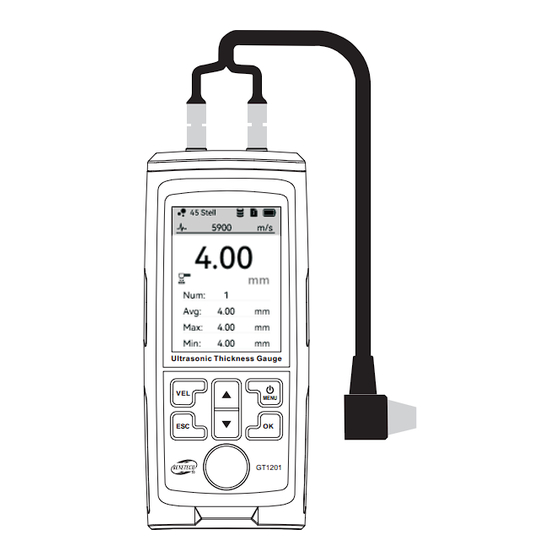
Summary of Contents for Benetech GT1201
- Page 1 MODEL GT1201 : Ultrasonic Thickness Gauge Instruction Manual Ultrasonic Thickness Gauge MENU GT1201...
-
Page 2: Table Of Contents
CONTENTS A. Introduction ............B. Feature..............1 C. Name of parts ............D. Technical parameters ..........E. Operation instructions ..........F. Measurement interface ........... G. Measurement interface menu operation ....H. Main menu function operation ......... I. PC software ............ -
Page 3: Introduction
A. Introduction The intelligent and hand-held ultrasonic thickness gauge is controlled by a microprocessor, which can measure thickness and sound speed of various materials quickly, accurately and without damage by ultrasonic measurement. This instrument is capable of accurate measurement for different materials or parts in industrial production, as well as monitoring pipelines and pressure vessels of production equipment, and corrosion degree of various parts in use. -
Page 4: Technical Parameters
D. Technical parameters 1.00~300.0mm(steel) Measurement range Data storage 1500 Operation frequency 5MHz / 2.5MHz ± 0.5%H+0.05)mm Measurement error 0.01mm(1.00~99.99mm) / 0.1mm(100~300mm) Measurement resolution Φ20x3mm(steel) Lower limit of pipe Sound speed measurement 1000~9999m/s Operating temperature 0~40℃ Battery 1000mAh 3.7V Lithium battery USB charging 5V 1A Dimensions... -
Page 5: Measurement Interface
F. Measurement interface 1. Selected material 2. Automatic save icon 3. File number 4. Battery level 5. Material sound velocity 6. Measurement value 7. Measurement unit 8. Coupling icon 9. Measurement information: During measurement, short press button to switch between measurement interface 1/measurement interface 2 Measurement interface 1... -
Page 6: Main Menu Function Operation
5. Sound velocity calibration: Sound velocity calibration of the material. Applicable Scenario: The materials built into the machine have a reference sound velocity. In actual measurement, the sound velocity of the material may deviate from the built-in velocity, or the measured material may not be in the built-in material list. - Page 7 short press the ESC button to confirm and exit the sound velocity setting. (3) 12 preset material sound velocities, 3 custom sound velocities available. (4) The selected sound velocity will be displayed on the measurement interface, sound velocity unit: m/s. 3.
-
Page 8: Pc Software
8. Reset: Restore factory settings. 9. Settings: (1) Language: Choose between Chinese and English. (2) Shutdown time: Set automatic shutdown time: 5 minutes, 10 minutes, 30 minutes, never. (3) Keypad sound: Enable/disable keypad sound. (4) Backlight: Choose between constant backlight, high brightness. 10. -
Page 9: Avoid Measurement Error
for the pipe with smaller diameter, the crosstalk spacer of probe can be either parallel or vertical to the axis of material.The minimum reading is selected as the measured thickness. 5. Measurement of composite shape: When measuring materials of composite shapes (such as elbow of pipe), the method described in "J. - Page 10 2. Rust spots and corrosion pits Rust spots and corrosion pits on the other surface of the tested material will cause readings to change irregularly or no reading in extreme cases, and small rust spots are sometimes difficult to detect. When pits are found or suspected, be careful with the measurement of this area, and place the crosstalk spacer of probe at different angles for multiple tests.
-
Page 11: Sound Velocities Of Common Materials
L. Sound velocities of common materials Velocity(m/s) Velocity(m/s) Material Material Aluminum 6320 Acetate resin 2670 Phosphor bronze Zinc 4170 3530 Turpentine 3600 4430 Silver Gold 3240 Glass 5440 Incoloy alloy 3230 5720 Magnesium 5900 6310 Iron/Stee Monel alloy Brass 4640 6020 Copper 4700... - Page 12 Specific Declarations: Our company shall hold no any responisibility resulting from using output from this product as an direct or indirect evidence. We reserves the right to modify product design and specification without notice. Version: GT1201-EN-00...













Need help?
Do you have a question about the GT1201 and is the answer not in the manual?
Questions and answers